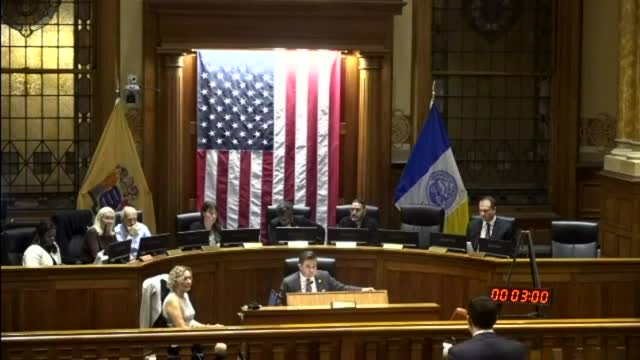Council adopts ordinance imposing mandatory minimum fines for housing-code violations to strengthen enforcement
October 13, 2025 | Jersey City, Hudson County, New Jersey
This article was created by AI summarizing key points discussed. AI makes mistakes, so for full details and context, please refer to the video of the full meeting. Please report any errors so we can fix them. Report an error »

The Municipal Council unanimously adopted ordinance 25-105 to establish mandatory minimum fines and continuing violations for breaches of Jersey City's housing-related ordinances, aiming to strengthen enforcement against negligent landlords. The final vote was 9-0.
The ordinance applies to multiple provisions of the municipal code — including provisions in chapters 2-18 (multiple dwellings), 2-54 (property maintenance) and 2-60 (rent control) — and creates continuing violations so that repeated or ongoing failures can be cited in an administratively feasible way. Public speakers and tenant advocates urged strong penalties; tenant organizer Kevin Weller told the council, "This ordinance establishes a mandatory minimum fine of $100 per tenant or per unit per day," and argued the fines are intended as a floor rather than a negotiable amount.
Supporters told the council that the city currently faces an enforcement workload that permits repeat noncompliance: several speakers said small fines and slow administrative processes have enabled landlords to treat violations as a cost of doing business. Mark Boyles and other commenters said mandatory minimums would change that cost calculus and protect tenants. Daniel Feldman and Michelle Hirsch, leaders in tenant organizations at Portside Towers, described specific safety and security issues and argued the ordinance would give Director Chiron Richardson and municipal prosecutors the tools needed to reduce repetitive violations.
Council discussion acknowledged concerns about administrative capacity and emphasized that the ordinance reduces paperwork associated with repeated filings by allowing a single summons to address continuing violations affecting multiple tenants. One council member who worked with staff and the municipal prosecutor said the ordinance reflects multiple rounds of review and is intended to provide more effective enforcement tools rather than to target specific landlords.
The council voted to close the public hearing and moved to final adoption; the ordinance was adopted unanimously. The measure tasks municipal enforcement and the prosecutor's office with implementing the fines and continuing-violation framework. The ordinance sets out the mandatory-minimum concept and directs enforcement; application and collection will follow municipal enforcement procedures and court dispositions.
The ordinance applies to multiple provisions of the municipal code — including provisions in chapters 2-18 (multiple dwellings), 2-54 (property maintenance) and 2-60 (rent control) — and creates continuing violations so that repeated or ongoing failures can be cited in an administratively feasible way. Public speakers and tenant advocates urged strong penalties; tenant organizer Kevin Weller told the council, "This ordinance establishes a mandatory minimum fine of $100 per tenant or per unit per day," and argued the fines are intended as a floor rather than a negotiable amount.
Supporters told the council that the city currently faces an enforcement workload that permits repeat noncompliance: several speakers said small fines and slow administrative processes have enabled landlords to treat violations as a cost of doing business. Mark Boyles and other commenters said mandatory minimums would change that cost calculus and protect tenants. Daniel Feldman and Michelle Hirsch, leaders in tenant organizations at Portside Towers, described specific safety and security issues and argued the ordinance would give Director Chiron Richardson and municipal prosecutors the tools needed to reduce repetitive violations.
Council discussion acknowledged concerns about administrative capacity and emphasized that the ordinance reduces paperwork associated with repeated filings by allowing a single summons to address continuing violations affecting multiple tenants. One council member who worked with staff and the municipal prosecutor said the ordinance reflects multiple rounds of review and is intended to provide more effective enforcement tools rather than to target specific landlords.
The council voted to close the public hearing and moved to final adoption; the ordinance was adopted unanimously. The measure tasks municipal enforcement and the prosecutor's office with implementing the fines and continuing-violation framework. The ordinance sets out the mandatory-minimum concept and directs enforcement; application and collection will follow municipal enforcement procedures and court dispositions.
View full meeting
This article is based on a recent meeting—watch the full video and explore the complete transcript for deeper insights into the discussion.
View full meeting
